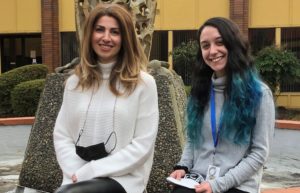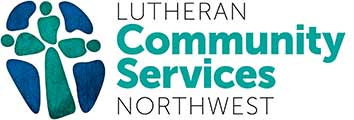These Oregon colleagues are immigrants, vaccine clinic organizers and ‘agents of change’

Leen Saheb (left) and Maria Hands Ruz started last year coordinating vaccination clinics as LCSNW Medical Case Managers. But now they are doing much more.
Meet: Leen Saheb and Maria Hands Ruz
Job: Medical Case Managers
District: Multicultural Services – Beaverton
To protect themselves against COVID-19 this past fall and winter, hundreds of immigrants and other marginalized people in the Portland metro area had to overcome several obstacles.
A dynamic duo from LCSNW played a key role in helping them do it.
Leen Saheb and Maria Hands Ruz are based in the agency’s Beaverton office, where the 21-person staff reflects the community’s rich ethnic diversity. Leen, an immigrant from Jordan, is a licensed Qualified Medical Interpreter who speaks Arabic. Maria, a native of Venezuela, is a college psychology graduate who speaks Spanish. They first met a few years ago when Leen Interpreted for an English class that Maria was teaching for an Arabic support group.
Last fall they reunited to coordinate an LCSNW contract with Washington County and the State of Oregon. Their mission: To bring vaccinations and other resources to demographic groups at risk of falling through the cracks during the pandemic.
“If you love helping others and have a passion for that, then this is the right job for you,” Leen says. She came to Portland with her husband and young daughter 10 years ago, then developed the interpretation skills that have kept her in contact with fellow Arabic-speaking immigrants.
At first Leen and Maria were focused on organizing a series of vaccine clinics held at a Beaverton church. Their target audience was Arabic, Spanish, Russian and Korean families. They provided education materials in those languages while arranging food box giveaways and art activities for children. All told, more than 600 people rolled up their sleeves for vaccines or boosters.
Today, Leen and Maria’s vaccine clinic work has tapered off, though it might resume in some form if the virus rebounds or the FDA authorizes shots for children under age 5.
Meantime, their efforts have shifted to helping clients become more resilient. They’re directing people to mental health counseling; caregiver, employment and housing services; and Oregon Health Plan benefits they might not even know they qualify for.
“It’s become more personal in how we provide care,” says Maria, who moved to the U.S. five years ago to study at Portland Community College. The Pacific University graduate has a second job facilitating therapy groups at a youth psychiatric facility.
As LCSNW case managers, there’s a common thread running through all that Leen and Maria do: They must build trust in communities that sometimes resist outside help due to culture, language or other barriers. A recent University of Chicago study showed that use of a familiar language can significantly decrease vaccine hesitancy.
But doing this job well goes beyond cultural awareness. “Leen and Maria have the cognizance and accurate perception of what people of color, refugees and immigrants face in terms of discrimination and racial injustice,” says Dalia Baadarani, MCS associate clinical director. She describes the two women as “agents of change.”
FUN FACT ABOUT LEEN: She and her husband and two children love to camp at Three Creek Lake near Bend, Oregon. “It’s like you’re in heaven. It’s so quiet and peaceful! There’s no Internet or phone connection, nobody can reach you.”
FUN FACT ABOUT MARIA: She first came to the U.S. as a high school exchange student in an Iowa town. “There were a lot of cowboy boots but I didn’t wear any.”

0 Comments